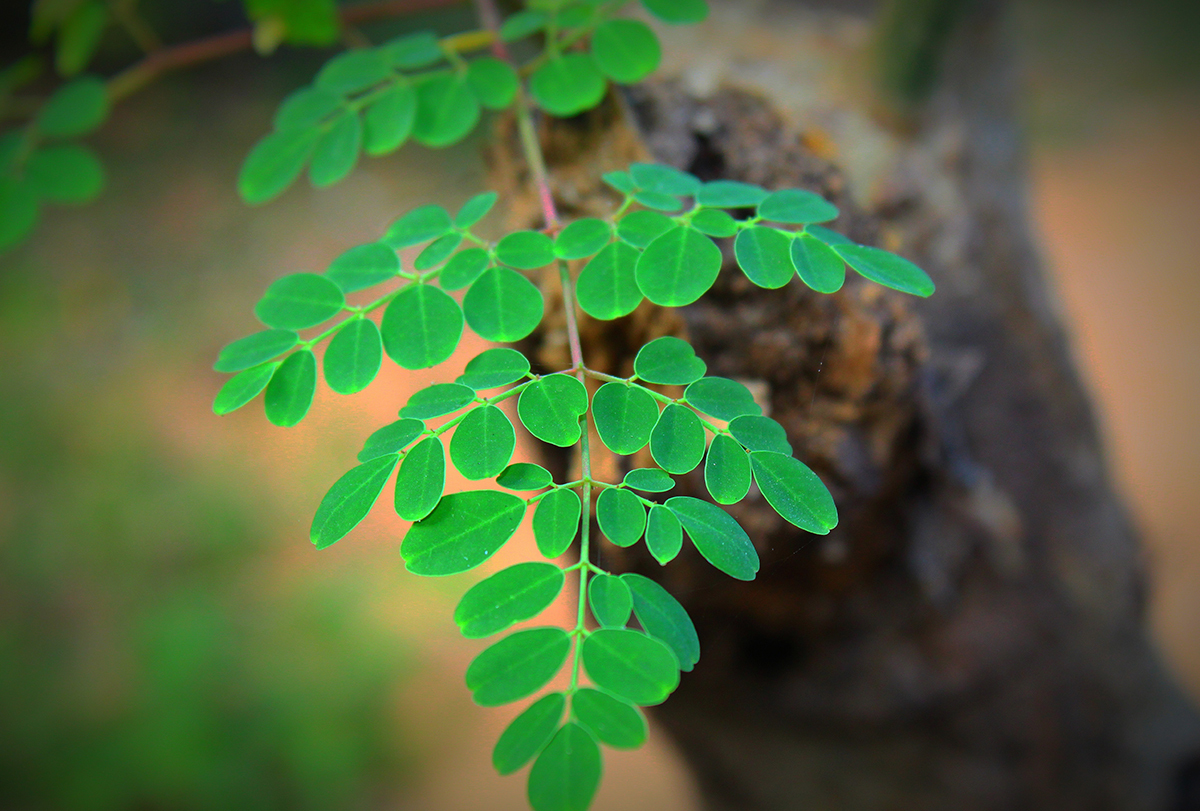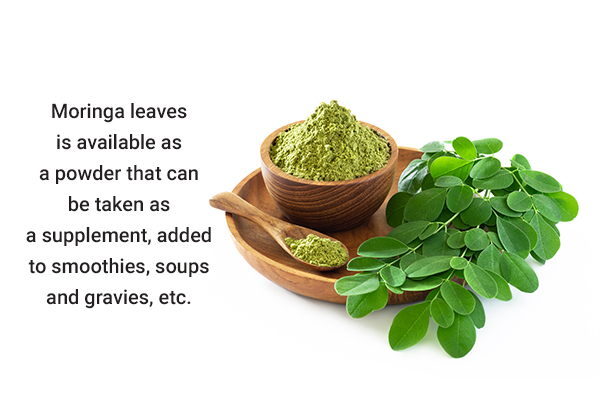In this article:
Moringa (Moringa oleifera) is also called the “tree of life” or “miracle tree” because of how nutritionally potent it is.

Moringa is also called the horseradish tree or drumstick tree, and it belongs to the family Moringaceae. It is native to tropical Asia but is also cultivated in Africa and tropical America. (1)
Native to the Indian subcontinent, moringa tree is cultivated for its small leaves and its fruit that looks like thin slender pods (also called drumsticks) containing seeds.
With seven times more vitamin C than oranges, 17 times more calcium than milk, and 15 times more potassium than bananas, moringa is now widely marketed in the United States as a dietary supplement. (2)
Because of its wide-ranging benefits, moringa can be used to manage close to 300 illnesses ranging from diabetes to cancer. (3)
Nutritive Value of Moringa Leaves
Moringa leaves are particularly used for their medicinal properties and are available as supplements either in powder or capsule form.
One serving of dried moringa leaves (5 g) provides: (3)
- 1.5 g of protein
- 0.6 g of fiber
- 109.3 mg of calcium
- 61.8 mg of potassium
- 1.3 mg of iron
- 0.8 mg of vitamin C
The vitamin C content of fresh moringa leaves is more than that of the dried leaves with one serving (100 g) giving 220 mg of vitamin C. (3)
Common Ailments Moringa Can Be Used For
Here are some common uses and benefits of moringa as a supplement or as part of your diet.
1. Treats anemia
Anemia is a big health burden and affects a large part of the world’s population. It is caused by a deficiency of iron in the diet and results in low levels of hemoglobin (which carries oxygen-rich blood to the body) and low levels of circulating oxygen. (4)
Due to their high iron content, moringa leaves, either fresh or dried (as supplements), can be used to treat anemia, especially in young children, as shown by a study where the administration of moringa leaf powder supplement for 6 months reduced the severity of anemia by 69%–77%. (5)
Moringa leaf supplementation could also benefit pregnant women who are at a high risk of developing anemia. Studies also found it to improve milk production in breastfeeding mothers and to reduce stress. (6)
2. Manages type 2 diabetes

Moringa leaf supplementation is beneficial for people with type 2 diabetes due to its antidiabetic activity. Not only can it effectively reduce post-meal blood sugar spikes in people with diabetes, but it can also reduce the risk of developing oxidative stress in the body. (7)
In type 1 diabetes, the pancreas cannot produce insulin, and patients suffering from this type of diabetes need to take exogenous (artificial) insulin via injections. In type 2 diabetes, cells of the body become resistant to insulin. In such a case, the cells cannot absorb glucose, resulting in a rise in blood sugar levels.
While medication may be required for type 2 diabetes, it can also be managed with diet and lifestyle changes. (8)
One study showed that 4 g of moringa leaves was able to increase insulin secretion from the pancreas in healthy subjects, which could be a promising treatment for reducing blood sugar levels, especially for people with type 2 diabetes. (9)
Experts collectively agree on requiring more research to identify the beneficial dose.
3. Lowers blood pressure
Moringa leaves also have the capacity to reduce blood pressure by relaxing the blood vessels, which relaxes the flow of blood through them. (10)
In a study where the participants ate cooked fresh moringa leaves (120 g), a significant reduction in both systolic and diastolic blood pressure was observed after their meal. (11)
These studies show promising results in the use of moringa leaves for the natural management of blood pressure.
4. Prevents metabolic diseases
Metabolic diseases are a group of diseases that include obesity, hypertension, diabetes, and insulin resistance that increase the risk of death and overall illness in a person. (12)
Animal studies have shown moringa leaf supplementation to benefit all parameters of metabolic disease including managing weight, reducing cholesterol, and improving insulin sensitivity. (13)
Though more focused clinical studies are needed, it is likely moringa will have the same benefits in humans.
5. Eases the symptoms of arthritis

Arthritis is a painful condition that affects the joints, cartilage, and bone. It can severely impact daily life and can hardly be managed without medication. The good news is moringa has been found to immensely benefit arthritic symptoms. (14)
Animal studies have found extracts of moringa leaves to have a painkiller-like effect and reduce the inflammation associated with arthritis. (14)
Recently, moringa seeds have also been identified to have anti-arthritic properties. (15) More clinical trials are needed to identify the exact mechanism and dosages.
6. Helps fight infections
Moringa leaves have strong antibacterial and antiviral properties and can be useful in protecting against infections and illnesses.
Taking 1–2 tablespoons of dried moringa leaf powder daily can be a great way to boost immune function and health. (16)
7. Improves brain health
The use of moringa can not only boost memory but can also offer protection against degenerative diseases such as dementia and Alzheimer’s disease.
Studies have found its high polyphenolic content to be the reason. It protects the nerves and cells of the brain from damage by free radicals that enter the body. (17)
Moringa leaves can also be used to manage and treat depression, where they mimic the action of antidepressant drugs in the body. (18)
8. Improves asthma

Moringa leaves can help improve the symptoms of asthma. In a study of people with bronchial asthma, dried seeds of moringa (3 g each day for 3 weeks) improved all the symptoms of asthma and eased breathing. (19)
9. Fights diseases of the digestive system
The antioxidant capacity of moringa benefits diseases of the digestive system such as ulcerative colitis. (20)
Ayurveda also recognizes the beneficial digestive properties of moringa leaves. Studies have found them to have a mild laxative-like effect, which in combination with their high fiber content can benefit constipation. (21)
10. Aids in healing diseases of the skin
Nutrient-dense moringa is highly beneficial for the skin. Studies have found that topical application of moringa extract from the leaves and seeds of the plant is useful for revitalizing the skin and making it smooth and young looking. (22)
In a more recent study, moringa seed oil was also found to be useful for inflammatory skin diseases due to its high antioxidant content. (23)
11. Improves fertility in men
Moringa’s usefulness is extended toward promoting and improving fertility in men. Studies have found moringa leaves to prevent sperm damage and preserve sperm action.
In animal studies, moringa leaf along with hormone supplementation improved the maturation of sperm cells, which in turn increased fertility. (24)
In another study, moringa leaf tea enhanced sexual function and reproductive ability due to its rich polyphenol, flavonoid, and antioxidant content. (25)
12. Prevents cancer
The high polyphenol content of moringa is a potent medicine against cancer. The antioxidant ability of moringa leaves protects the cells from damage by free radicals, which is how healthy cells of the body turn cancerous. (26)
Studies have found moringa leaves to kill cancer cells, prevent their spread and growth, and clear out inactive cancer cells from the body. (26)
How to Use Moringa

Moringa leaves are available as powder, which can be taken as a supplement or added to smoothies, soups, and gravies. But this supplement is expensive.
The good news is it can be easily made at home!
Here is how you can prepare your own dried moringa leaf powder:
- Buy and separate fresh leaves from the branches. They are fairly easy to do.
- Wash the leaves well and dry on a towel.
- Once all the water is gone, lay them in a flat baking tray and dry them in the oven at a low temperature with its door cracked open. Alternatively, you can leave it in the sun to dry.
- Once dried, blend in a dry blender until powdered.
- Store in an airtight container and consume 1 tablespoon at a time.
Who Should Avoid Moringa?
Moringa is generally safe for everyone. However, if you are pregnant or breastfeeding, consult your primary doctor before consuming supplements.
Practical Takeaways
- Moringa is a highly nutritious plant that is native to the Indian subcontinent. Its leaves, pods and seeds, and flowers are all consumed.
- Rich in calcium, iron, and many vital nutrients, moringa can help manage close to 300 diseases.
- Moringa is mainly used to improve outcomes of anemia as it has high iron content, boosts immunity, and helps fight infections.
- The anti-inflammatory property of moringa can help in easing arthritis, managing ulcerative colitis, and preventing age-related brain degeneration.
- Moringa can also reduce blood pressure, control type 2 diabetes, and help reduce weight.
- Fresh moringa leaves can be consumed in dishes or added to flours for wraps and breads. Dried moringa leaf powder can be used in smoothies or added to soups and gravies.
- Was this article helpful?
- YES, THANKS!NOT REALLY


